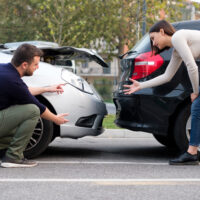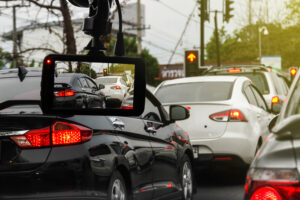Rear-End Collision Fault: When Is A Rear-End Collision Not Your Fault in Florida?

According to NHTSA, rear-end collisions are the most common type of car accident, accounting for nearly 29% of all crashes and resulting in a high number of injuries and fatalities each year. Today, the Orlando car accident lawyers at the Law Offices of Pardy & Rodriguez, P.A., will discuss the causes of rear-end accidents, how rear-end collision fault is determined, and what to do if you’re ever rear-ended.
What causes most rear-end collisions
Like many accidents, a rear-end collision is often the result of a driver’s negligence or failure to drive safely.
To determine fault in car accidents, it’s important to understand how they happen:
- Distracted driving. Eating, talking on the phone, or daydreaming can keep a driver from focusing on the road. A 2018 study by AAA Foundation for Traffic Safety found that texting while driving increases chances of a rear-end collision by a multiple of 7.
- Speeding. Drivers who speed are unable to slow down during traffic. A rear-end accident can happen in a split second.
- Weather. Drivers should reduce their speed limit in extreme conditions such as ice or heavy rain to prevent skidding and rear-ending another vehicle.
- Impaired driving. Drugs and alcohol delay a driver’s response time, making it difficult to react and avoid a rear-end collision if the driver in front hits the brakes suddenly.
- Tailgating. Like speeding, following too closely does not allow a driver to slow down in time or stopping distance to avoid a rear-end collision.
- Road rage. Anger causes drivers to exhibit dangerous behavior, such as intentionally hitting their brakes, increasing the risk of causing an accident.
- Mechanical failures. Faulty braking systems can cause a driver to crash into a car, even if the driver tries to stop in time.
Depending on whether it’s a single or multiple rear-end collision, placing blame is harder than it seems. A skilled auto accident lawyer in Orlando can help.
When is a rear-end collision not your fault?
The driver who rear-ends the other vehicle is assumed to be at fault.
But not always.
Florida law requires drivers to leave space between their vehicle and the vehicle ahead of them. However, the following circumstances beyond your control cannot be your fault in a rear-end collision:
- The driver suddenly stops to turn, but doesn’t follow through.
- The driver puts the car in reverse.
- The driver’s brake lights don’t function properly.
- The driver was impaired by distraction, alcohol, drugs, or fatigue.
- The driver was trying to avoid an animal, pedestrian, or debris.
There are solid ways to prove the accident wasn’t your fault. For example:
- Dash cam or camera footage may have video evidence to show that the front driver didn’t follow through on the turn.
- Inspection by an expert can show the driver’s brake lights were defective at the time of the accident.
- Results from field sobriety tests performed by the police can show the driver was impaired by drugs or alcohol.
Finally, photos of the scene could reveal tire skid marks to show the driver was trying to avoid a road obstruction.

Dash cam video can help prove fault in a rear-end collision. Share this evidence with your Orlando car accident attorney.
The impact of rear-end collision fault on compensation
Since Florida follows the comparative negligence rule, compensation is awarded based on a driver’s percentage of fault in an accident.
For example, if you were texting and driving, you may be 20% at fault for the rear-end accident. Any financial compensation you receive will be reduced by 20%. The issue, though, is how to assign the exact percentage of fault to each driver involved.
Evidence is the best way to prove fault. Only a qualified car accident attorney can help you gather police reports, witness testimony, photos, and video surveillance to possibly reduce or eliminate your percentage of rear-end collision fault.
What to do when you get rear-ended in Florida
Here are some steps to follow if you are involved in a rear-end collision:
- Call the police
- Seek medical attention
- Exchange driver, witness, and insurance information
- Take photos and videos
- Contact an experienced Orlando car accident lawyer to help determine fault
For more information, review our 5 do’s and don’ts to follow after a car accident.
Our Orlando car accident attorneys can clear up who’s at fault in your rear-end accident
If you or a loved one has been injured in a rear-end collision, seek legal help from a knowledgeable car accident attorney in Orlando.
Let Pardy & Rodriguez put more than 35 years of legal experience to work and give you peace of mind in your rear-end collision case. To get help from a firm that’s dedicated to you and your family, contact us online or call us for a free consultation.


